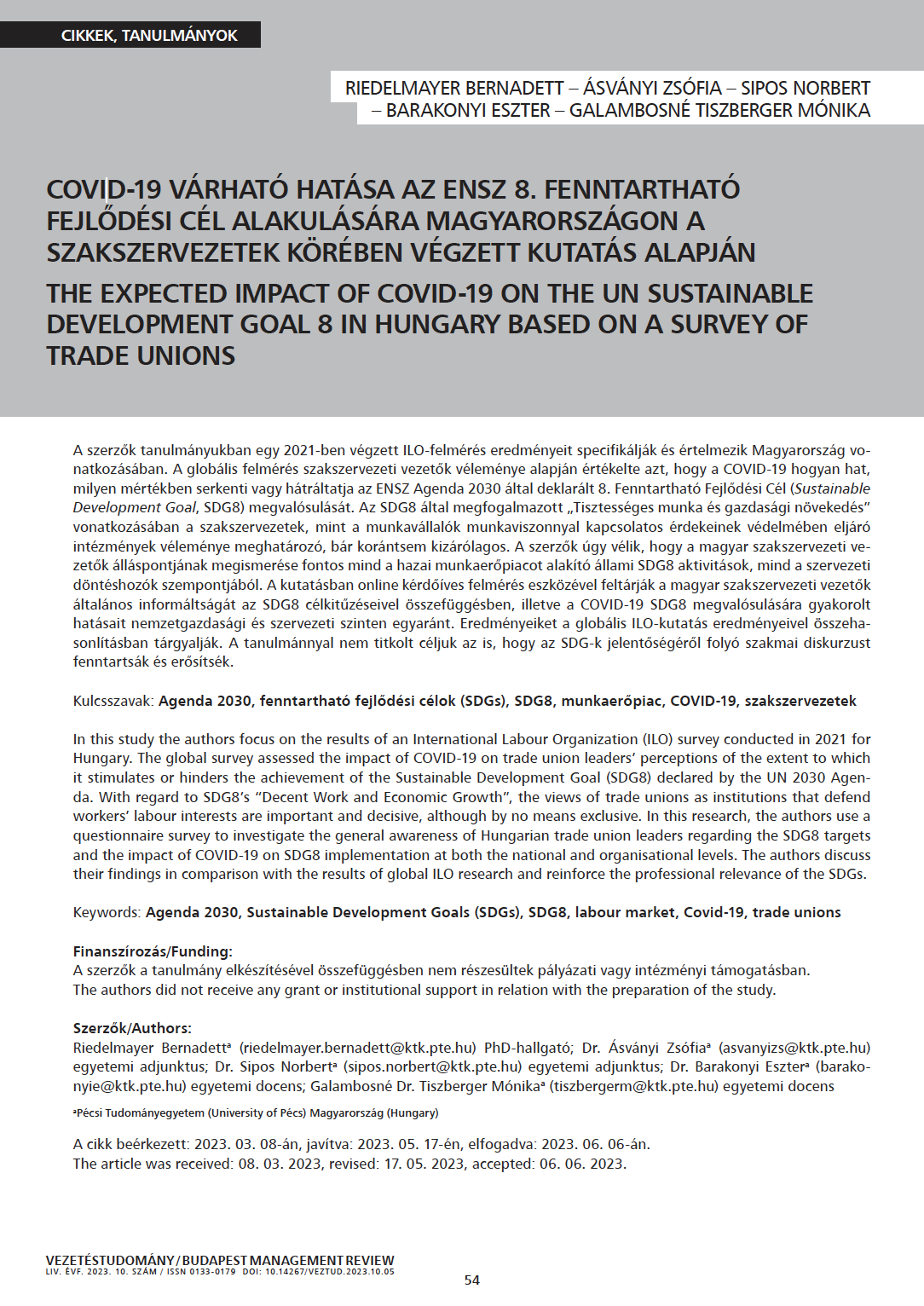The expected impact of COVID-19 on the UN Sustainable Development Goal 8 in Hungary based on a survey of trade unions
DOI:
https://doi.org/10.14267/VEZTUD.2023.10.05Keywords:
Agenda 2030, Sustainable Development Goals (SDGs), SDG8, labour market, COVID-19, trade unionsAbstract
In this study the authors focus on the results of an International Labour Organization (ILO) survey conducted in 2021 for Hungary. The global survey assessed the impact of COVID-19 on trade union leaders’ perceptions of the extent to which it stimulates or hinders the achievement of the Sustainable Development Goal (SDG8) declared by the UN 2030 Agenda. With regard to SDG8’s “Decent Work and Economic Growth”, the views of trade unions as institutions that defend workers’ labour interests are important and decisive, although by no means exclusive. In this research, the authors use a questionnaire survey to investigate the general awareness of Hungarian trade union leaders regarding the SDG8 targets and the impact of COVID-19 on SDG8 implementation at both the national and organisational levels. The authors discuss their findings in comparison with the results of global ILO research and reinforce the professional relevance of the SDGs.
Downloads
References
ÁSZ Elemzés (2020). Járványhelyzet és munkaerőpiac: A járványhelyzettel összefüggő gazdaságvédelmi akcióterv munkaerőpiacra gyakorolt hatásai. 2020/09.
Barbier E. B., & Burgess, J. C. (2017). The sustainable development goals and the systems approach to sustainability. Economics, 11(2017-28), 1-22. https://doi.org/10.5018/economics-ejournal.ja.2017-28
Drabancz Á., & El-Meuch N. M. (2020). Jókor jó helyen – Növekedésre képes cégek átmeneti likviditási nehézségein enyhít a bértámogatási program. https://www.mnb.hu/letoltes/drabancz-aron-el-meouch-nedim-marton-jokor-jo-helyen-bertamogatasi-program-segiti-a-novekedesre-kepes-cegeket.pdf
Drabancz Á., El-Meuch N. M., & Lang P. (2021). A koronavírus járvány miatt bevezetett jegybanki és állami hitelprogramok hatása a magyar foglalkoztatásra. Közgazdasági Szemle, 68(9), 930-965. http://dx.doi.org/10.18414/KSZ.2021.9.930
Eurofound. (2020). COVID-19: Policy responses across Europe. Publications Office of the European Union. https://www.eurofound.europa.eu/sites/default/files/ef_publication/field_ef_document/ef20064en.pdf
Faragó T. (2015). A fenntartható fejlődés új ENSZ-programja. https://www.greenfo.hu/wp-content/uploads/dokumentumtar/a-fenntarthato-fejlodes-uj-ensz-programja.pdf
GKI. (2020a). Áprilisban óriásit zuhant a GKI fogyasztói bizalmi indexe. G KI G azdaságkutató Z rt. https://www.gki.hu/wpcontent/uploads/2020/04/GKI-fogyaszt%C3%B3i-bizalmi-index-200409.pdf
GKI. (2020b). A járvány következtében kényszerszabadságolásra és elbocsátásra kényszerülnek a hazai cégek. https://www.gki.hu/wp-content/uploads/2020/04/GKI-A-j%C3%A1rv%C3%A1ny-foglalkoztat%C3%A1si-hat%C3%A1sai-20200420.pdf
GKI. (2020c). Második hónapja nem tud emelkedni a GKI konjunktúraindexe. https://www.gki.hu/wpcontent/uploads/2020/09/GKI_konj_2009.pdf
Hoffman, J. E. I. (2019). Categorical and cross-classified data: goodness of fit and association in basic biostatistics for medical and biomedical practitioners. In Basic Biostatistics for Medical and Biomedical Practitioners (2nd Edition) (pp. 197-231). Academic Press. https://doi.org/10.1016/B978-0-12-817084-7.00014-0
Ignits Gy., Mód P., Nagy Á., & Varga L. (2018). Beszámoló a 2017. évi közfoglalkoztatásról. Belügyminisztérium. https://kozfoglalkoztatas.kormany.hu/download/c/7a/32000/Besz%C3%A1mol%C3%B3_2017_20180621.pdf
Ignits Gy. (2021). A pandémiás válság munkaerőpiaci hatásairól – Statisztikai lehetőségek, kihívások és fókuszok a folyamatok számbavételére. Új Munkaügyi Szemle, 2(1), 31-45. https://www.metropolitan.hu/upload/59020f909eaa9b26989f22c48579dee0e32510a3.pdf
ILO. (2021). The likely impact of COVID-19 on the acheivement of SDG8. ILO. https://www.ilo.org/wcmsp5/groups/public/---ed_dialogue/---actrav/documents/publication/wcms_770036.pdf
ILO. (2020). Impact of lockdown measures on the informal economy. A summary. ILO. https://www.ilo.org/wcmsp5/groups/public/---ed_protect/---protrav/---travail/documents/briefingnote/wcms_743534.pdf
ILO Monitor (2021). COVID-19 and the world of work. Eighth edition Updated estimates and analysis. ILO. https://www.ilo.org/wcmsp5/groups/public/---dgreports/---dcomm/documents/briefingnote/wcms_824092.pdf
Jancsovszka P. (2016). Fenntartható fejlődési célok (Sustainable Development Goals). Tájökológiai Lapok, 14(2), 171-181. http://real.mtak.hu/43652/1/07_Jancsovszka.pdf
Juhász P., & Szabó Á. (2021). A koronavírus-járvány okozta válság vállalati kockázati térképe az első hullám hazai tapasztalatai alapján. Közgazdasági Szemle, 68(Különszám), 126–153. http://dx.doi.org/10.18414/KSZ.2021.k.126
Katona M., & Petrovics N. (2021). Válság és együttműködés. Közgazdasági Szemle, 68(1), 76–95. http://dx.doi.org/10.18414/KSZ.2021.1.76
Köllő J., & Reizer B. (2021). A koronavírus-járvány első hullámának hatása a foglalkoztatásra és a vállalatok árbevételére. Közgazdasági Szemle, 68(4), 345–374. https://doi.org/10.18414/KSZ.2021.4.345
Kőműves Zs. S., Dajnoki K., Pató G. Sz. B., Poór J., Szabó K., Szabó-Szentgróti G., & Szabó Sz. (2022). Kilábalás – Újranyitás – Növekedés: Poszt-COVID-szindróma és bizonytalan helyzet menedzsment szempontjai. Wolters Kluwer Hungary. KSH. (2019). Munkaerőpiaci folyamatok. I–IV. Negyedév. https://www.ksh.hu/docs/hun/xftp/idoszaki/mpf/mpf194/index.html
KSH. (2023). A foglalkoztatottak száma korcsoportok szerint, nemenként, negyedévente. https://www.ksh.hu/stadat_files/mun/hu/mun0110.html
KSH. (2022). Reálkeresetek alakulása. https://www.ksh.hu/stadat_files/mun/hu/mun0070.html
Meadows, D. H., Meadows, D. L., Randers, J., & Behrens, III W. W. (1972). The Limits to Growths. Potomac Associates. Universe Books. https://www.donellameadows.org/wp-content/userfiles/Limits-to-Growth-digital-scan-version.pdf
MNB. (2020). Pénzügyi stabilitási jelentés. https://www.mnb.hu/letoltes/penzugyi-stabilitasi-jelentes-2020-may.pdf
Pató, B. S. G. (2022). Coronavirus crisis challenges and HR responses–Hungary 2020–framework of domestic research. JEEMS Journal of East European Management Studies, 27(3), 552-578. https://doi.org/10.5771/0949-6181-2022-3
Pató, G. SZ.B., Dajnoki, K., Kovács, K., Kőműves, ZS.S., Grotte, J., Szabó, SZ., Kunos, I., Metszősy, G., Hegedűs, H., & Karácsony, P. (2021). A HR válasza a koronavírus-járvány okozta kihívásokra. Vezetéstudomány, 52(8-9), 2-17. https://doi.org/10.14267/VEZTUD.2021.09.01
Pirohov-Tóth B. (2022). Munkapiaci trendek a koronavírus- járvány idején. Vezetéstudomány, 53(1), 29-43. https://doi.org/10.14267/VEZTUD.2022.01.03
Pulay, Gy. (2020). Mennyire forgatta fel a COVID-19 járvány a munkaerőpiacot? Pénzügyi Szemle Online. https://www.penzugyiszemle.hu/tanulmanyok-eloadasok/mennyire-forgatta-fel-a-COVID-19-jarvany-a-munkaeropiacot
Szappanos, J. (2020). A COVID-19 járvány közpénzügyi hatásainak értékelése (EL-2555-020/2020). Állami Számvevőszék. https://www.asz.hu/storage/files/files/elemzesek/2020/COVID_20200629.pdf?download=true
Tóth, A., Szabó, Sz., Kálmán, B., & Poór, J. (2021). A foglalkoztatottság alakulása a magyar gazdaság szektoraiban a COVID-19 járvány következtében. Új Munkaügyi Szemle, 2(1), 2-23 http://real.mtak.hu/154542/1/TothA.pdf.
UN. (2015). Transforming our world: the 2030 Agenda for Sustainable Development. https://www.un.org/ga/search/view_doc.asp?symbol=A/RES/70/1&Lang=E
UN. (2000). United Nations Millennium Declaration. https://www.ohchr.org/EN/ProfessionalInterest/Pages/Millennium.aspx
UN. (2015). Sustainable Development Goals. Fact Sheet. UN. Time for Global Action for People and Planet. https://www.un.org/sustainabledevelopment/wp-content/uploads/2015/08/Factsheet_Summit.pdf
UN. (2020b). Shared Responsibility, Global Solidarity: Responding to the socio-economic impacts of COVID- 19. UN. https://www.un.org/sites/un2.un.org/files/sg_report_socio-economic_impact_of_COVID19.pdf
UN. (2020a). UN rights expert urges States to stepup anti-slavery efforts and protect most vulnerable amid COVID-19. OHCHR. https://www.ohchr.org/EN/NewsEvents/Pages/DisplayNews.aspx-?NewsID=25863&LangID=E

Downloads
Published
How to Cite
Issue
Section
License
Copyright (c) 2023 Vezetéstudomány / Budapest Management Review

This work is licensed under a Creative Commons Attribution 4.0 International License.
Authors assign copyright to Vezetéstudomány / Budapest Management Review. Authors are responsible for permission to reproduce copyright material from other sources.

